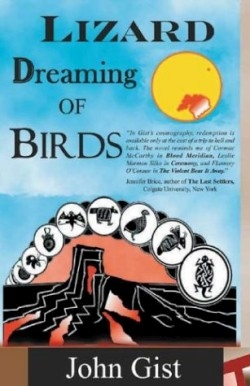
Lizard Dreaming of Birds
“Drifter” is the kindest term most people would use for Jubal Siner. Criss-crossing the West in an old Buick Wildcat, finding solitary solace in a hidden cabin, he skids through life, fleeing a succession of groovy scenes gone bad. Even so, Jubal has been lucky. Staying suspicion-free in the vicinity of three unrelated murders is a trick not every drifter can pull off. An observer who knew Jubal’s secrets would label him an SOB with a charmed life, or a sociopath.
Jubal might have a sardonic laugh at the charmed life idea, but he sees himself much differently. After glimpsing a wild god atop a cliff in adolescence, he finds the boundaries of everyday, orderly life unbearable. Sex, drugs, and death henceforth are his means of seeking salvation, or perhaps a return visit from his god.
Two of his friends meet violent ends in his company. Despite his cryptic style of conversation and poor personal hygiene, Jubal accumulates several girlfriends, some of whom reinforce his self-image as a unique part of a divine plan. Lorelei, the florist, echoes Jubal’s assurance that his friend Jesse had to die because he was too good for this earth.
The author received his MFA from the University of Alaska, Fairbanks, and was formerly the Director of Professional Writing at Western Carolina University; Crow Heart was his first book.
This is a strange novel, at times beautiful, yet nihilistic and violent beyond many readers’ tolerance. Evocative images stud its pages: “a river the color of aluminum foil … a heavy sky that threatened to fall to the ground like a hail of great bruises.” Only the wilderness inspires such loving descriptions, though. Human encounters are recounted in terms of smells, grimaces, and twisted similes. The contrast echoes Jubal’s perceptions. In an earlier time, he might have lived happily as a mountain man.
Lizard will strengthen Gist’s existing reputation among those drawn to “dark realism” and transgressive serious literature. Readers who like more upbeat material in their fiction will meet with a series of shocks. The “salvation” that Jubal reaches at the end of the book seems temporary at best. The author’s appropriation of icons of paganism and Christianity may offend members of both faiths, yet the story offers a view into a convincing world of surrealistic logic and nightmare events that surfaces fitfully in ordinary life.
Disclosure: This article is not an endorsement, but a review. The publisher of this book provided free copies of the book to have their book reviewed by a professional reviewer. No fee was paid by the publisher for this review. Foreword Reviews only recommends books that we love. Foreword Magazine, Inc. is disclosing this in accordance with the Federal Trade Commission’s 16 CFR, Part 255.
